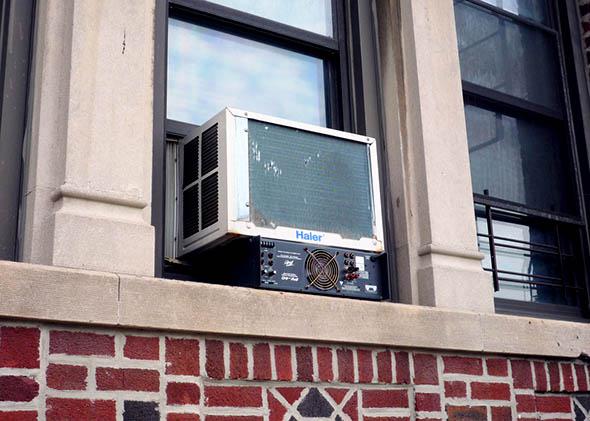I’ve never appreciated advice from strangers, and I’m getting plenty of it. Email chain letters, mostly, forwarded from a guy in New Orleans or a girl from Galveston, someone who’s lived through a few of these tropical storms in his or her day, and now deigns to provide a few hurricane tips for me and you and all the other friends-of-a-friend-of-a-friend on the Internet. I’ve been told to stay indoors (seems boring), tape my windows (seems futile), purchase gallons of bottled water (seems heavy), and remove the air-conditioning unit from my window (seems humid). I’m happy to ignore all these unwanted words of advice—that was my plan, at least—but the last did begin to nag at me Friday afternoon. I love my air conditioner; it’s my very favorite appliance. Am I really at risk if I leave it untouched? Or, more awful to think about, could my A/C be in danger, too?
I checked online and found doomsayer-talk of air-conditioners flying out of windows, or shooting across bedroom floors, or becoming so damaged by the rain and wind that they no longer functioned. Yes, it would be a pain to uninstall the 81-pound unit—but maybe, just maybe, worth the effort.
Then came the announcement from the mayor, calming words before the storm: “Michael Bloomberg discouraged people from removing air-conditioning units,” reported the New York Times’ City Room blog on Friday, “saying any benefits could be easily be outweighed by units accidentally falling into apartments or out of the window.”
Finally, an unambiguous message from someone I trust. The technocrats at City Hall had run the numbers—they’d placed risks and benefits side-by-side, activated the relevant statistical software, and determined that we’ll all be better off if my A/C stays in the window and I stay on my couch.
One anxiety begets another, though. What numbers went into this municipal calculation, I wonder. How did the mayor work through the costs and benefits? Was he saying that the chance of an Irene-related air-conditioner accident was close to zero? Or did he mean to imply that the chance of an air-conditioner-removal accident was even higher?
It’s not an idle question. I’m not planning to uninstall my dearly beloved LW1211ER this weekend, but summer’s almost over. I’ll be stowing the unit away in another two weeks, maybe three, and thousands more New Yorkers will do the same. Maybe it’s tens of thousands, or hundreds of thousands: We install and remove our window units every late spring and early fall. So what’s the death toll from this yearly rhythm?
Mayor Bloomberg seems to presume that if we take out our units for Hurricane Irene, we’ll be doubling the risk, whatever it is. (Another round of installations and removals would give us twice the opportunity to drop our appliances on babies and old people, I presume.) There are a number of flaws in this logic. First, it seems unlikely that many of those who removed their A/Cs for the storm would be inclined to reinstall them right after, less than a week before Labor Day. In that case, we’d have done little more than pushed the late-summer ritual of removal a few days earlier. Second, wouldn’t the hours leading up to the arrival of Hurricane Irene provide the best, safest opportunity to do that yearly maintenance? How many people are going to be out on the street this afternoon, passing under my window as the storm clouds gather? With so few pedestrians below, won’t the dangers be halved?
There’s an even better reason to doubt the mayor’s math, though. Despite a cottage industry in overcautious accoutrements—window netting and the like—the urban air-conditioner seems to pose only the barest danger to those on the sidewalk. A recent media survey conducted by the Village Voice found just a handful of falling-A/C incidents, and when the newspaper asked the Department of Buildings for comment, they were told that “accidents involving air conditioners are rare in New York City.”
Sure, there was the 67-year-old man who was struck last year as he walked his shih tzu down Second Avenue. And the 24-year-old man battered by a unit in New Jersey. Back in 2006, a 51-year-old woman had her leg shattered, her pelvis broken, and her ribs fractured by a falling A/C. There have been some cases in other big cities, too—a “freak accident” near London’s Waterloo Station, another hit in Chicago. But there isn’t much evidence that these exceedingly rare events have much to do with the actual installation or removal of the units. A sloppy job might cause an appliance to fall eventually, I suppose, but so could a rotting window frame or a bolt of lightning.
Also interesting, if not quite to the point, is the fact that these air-conditioner tragedies are almost never fatal. The Voice couldn’t find a single confirmed death in its survey. Even the New Jersey man, whose clobbering arrived from 15 stories above, seems to have weathered the insult just fine. (If anything, it’s falling the other way that’s the problem—like the mentally-handicapped 12-year-old boy who apparently dropped out of his bedroom window along with an air-conditioner in February 2007.) Somehow it doesn’t kill you when a giant box of metal strikes you unexpectedly in the head. I find that comforting.
Which leaves me to assume that it’s not really that dangerous to remove your air conditioner, this weekend or next weekend or the one after. The major costs in these cases, it seems, are the multimillion-dollar lawsuits that inevitably follow. That’s why I’ve decided that if I leave my unit in place, and it’s damaged in the storm, I’ll be taking Bloomberg to the cleaners.
